九年级英语时态课件
- 格式:ppt
- 大小:1.11 MB
- 文档页数:26
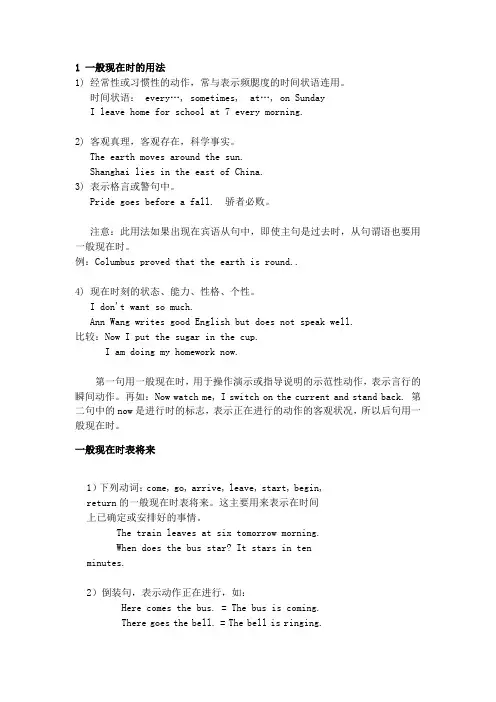
1 一般现在时的用法1) 经常性或习惯性的动作,常与表示频腮度的时间状语连用。
时间状语:every…, sometimes,at…, on SundayI leave home for school at 7 every morning.2) 客观真理,客观存在,科学事实。
The earth moves around the sun.Shanghai lies in the east of China.3) 表示格言或警句中。
Pride goes before a fall. 骄者必败。
注意:此用法如果出现在宾语从句中,即使主句是过去时,从句谓语也要用一般现在时。
例:Columbus proved that the earth is round..4) 现在时刻的状态、能力、性格、个性。
I don't want so much.Ann Wang writes good English but does not speak well.比较:Now I put the sugar in the cup.I am doing my homework now.第一句用一般现在时,用于操作演示或指导说明的示范性动作,表示言行的瞬间动作。
再如:Now watch me, I switch on the current and stand back. 第二句中的now是进行时的标志,表示正在进行的动作的客观状况,所以后句用一般现在时。
一般现在时表将来1)下列动词:come, go, arrive, leave, start, begin,return的一般现在时表将来。
这主要用来表示在时间上已确定或安排好的事情。
The train leaves at six tomorrow morning.When does the bus star? It stars in tenminutes.2)倒装句,表示动作正在进行,如:Here comes the bus. = The bus is coming.There goes the bell. = The bell is ringing.3)在时间或条件句中。
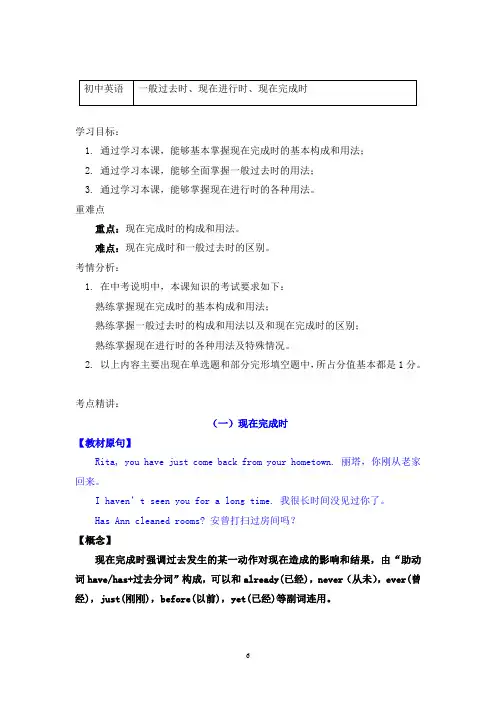
学习目标:1. 通过学习本课,能够基本掌握现在完成时的基本构成和用法;2. 通过学习本课,能够全面掌握一般过去时的用法;3. 通过学习本课,能够掌握现在进行时的各种用法。
重难点重点:现在完成时的构成和用法。
难点:现在完成时和一般过去时的区别。
考情分析:1. 在中考说明中,本课知识的考试要求如下:熟练掌握现在完成时的基本构成和用法;熟练掌握一般过去时的构成和用法以及和现在完成时的区别;熟练掌握现在进行时的各种用法及特殊情况。
2. 以上内容主要出现在单选题和部分完形填空题中,所占分值基本都是1分。
考点精讲:(一)现在完成时【教材原句】Rita, you have just come back from your hometown. 丽塔,你刚从老家回来。
I haven’t seen you for a long time. 我很长时间没见过你了。
Has Ann cleaned rooms? 安曾打扫过房间吗?【概念】现在完成时强调过去发生的某一动作对现在造成的影响和结果,由“助动词have/has+过去分词”构成,可以和already(已经),never(从未),ever(曾经),just(刚刚),before(以前),yet(已经)等副词连用。
1. 现在完成时强调过去发生的某一动作对现在造成的影响和结果。
—Have you found him yet ? 你已经找到他了吗?—No, he has probably gone home. 不,他大概已经回家了。
(现在不在这里)2. 现在完成时也可表示开始于过去并持续到现在的动作或状态,可以和表示从过去某一时刻延续到现在(包括“现在”在内)的一段时间的状语连用。
表示持续动作或状态的动词多是延续性动词。
I haven’t seen her these days. 我这些天没有看见过他。
He has taught us since I came to this school. 自从我来到这所学校,他一直教我们。
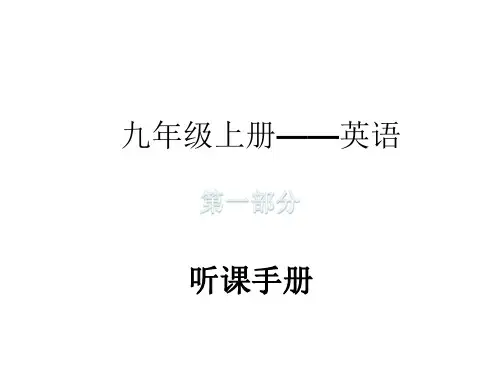
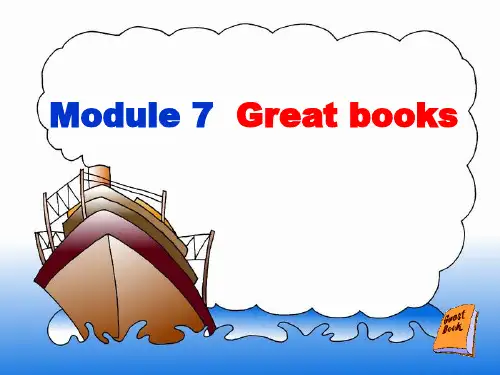
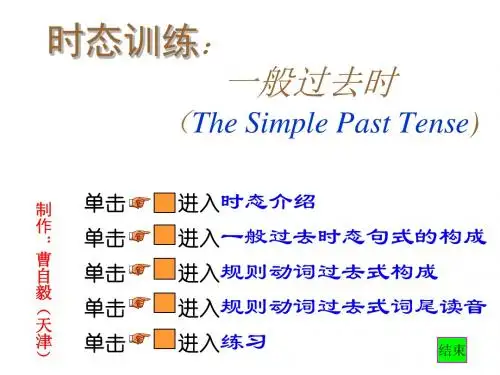
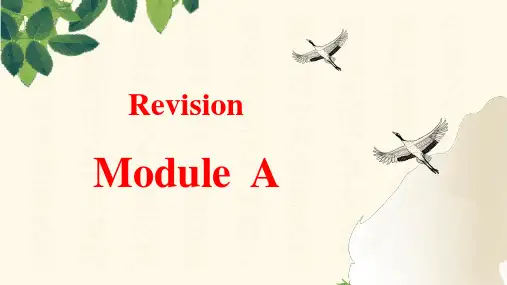
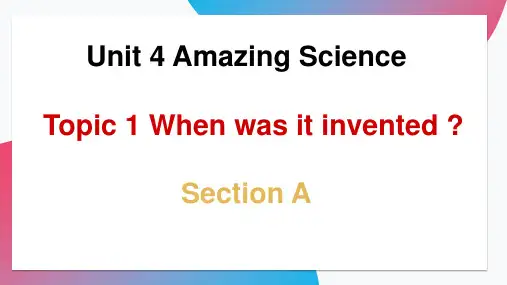
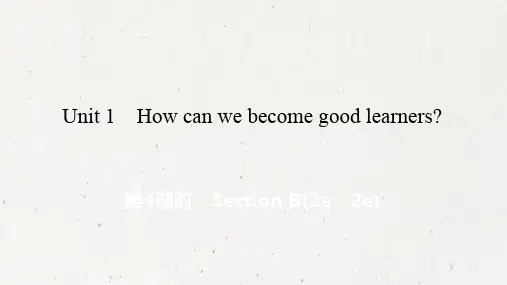
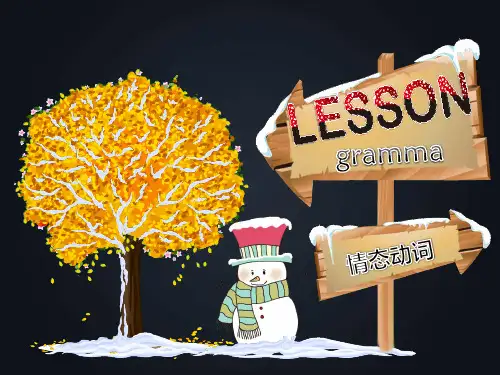
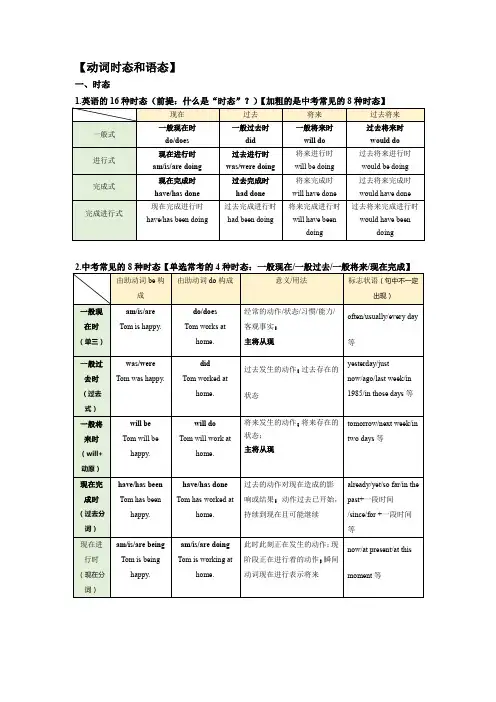
【动词时态和语态】一、时态3.主将从现(1)条件状语从句由if(如果)、as long as(只要)、unless(除非)引导,主句为一般将来时或表述将来含义,从句用一般现在时。
例如:She had better travel with a local tour guide if she wants to know more about the culture.(2)时间状语从句由when(当……时候)、as soon as(一……就……)、until(直到)等引导,主句为一般将来时或表述将来含义,从句用一般现在时。
例如:I’ll discuss this matter with you when we meet next time. / We won’t leave until Mary arrives.考点5 现在完成时have/has+(not+)过去分词(1)表示过去的动作对现在产生的结果和影响现在完成时表示过去某个时间曾经做过的、发生过的事情,对目前的某种影响,这时一般不用时间状语;也可以表示到目前为止没有发生或经历的事情。
The tickets have sold out.(票已售空。
)I have tried Italian food. It’s delicious!(我已经尝过意大利美食了。
美味啊!)Simon has seen the concert. He doesn’t want to see it again.(西蒙已经看过这场演唱会,不想再看了。
)I have never visited San Francisco in the U.S.A.(我从没去过美国的旧金山。
)(说明过去没有去过,现在仍没去过)I have just heard the news that our school will set up a press club.(我刚听到消息说我们学校要成立一个记者俱乐部。
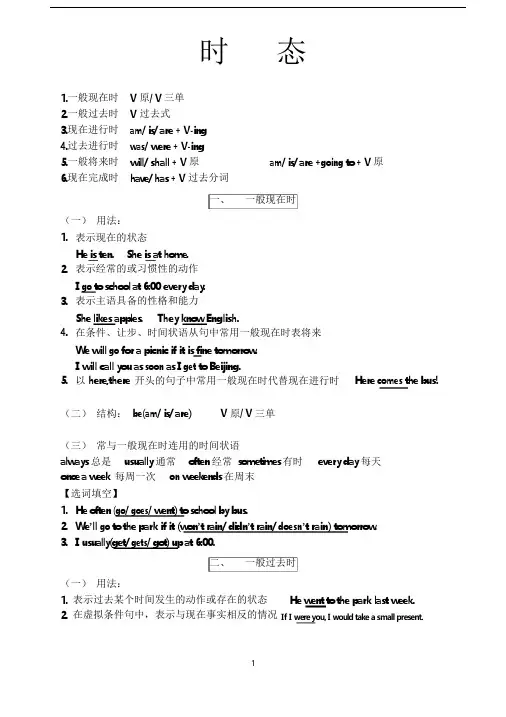
时态1.一般现在时V原/V三单2.一般过去时V过去式3.现在进行时am/is/are+V-ing4.过去进行时was/were+V-ing5.一般将来时will/shall+V原am/is/are+going to+V原6.现在完成时hav e/has+V过去分词一、一般现在时(一)用法:1.表示现在的状态He is ten.She is at home.2.表示经常的或习惯性的动作I go to school at6:00every day.3.表示主语具备的性格和能力She likes apples.They know English.4.在条件、让步、时间状语从句中常用一般现在时表将来W e will go for a picnic if it is fine tomorrow.I will call you as soon as I get to Beijing.5.以here,there开头的句子中常用一般现在时代替现在进行时Here comes the bus!(二)结构:be(am/is/are)V原/V三单(三)常与一般现在时连用的时间状语always总是usually通常o ften经常sometim es有时every day每天once a w eek每周一次on w eek ends在周末【选词填空】1.He o ften(go/goes/went)to school by bus.2.W e’ll go t o the park if it(won’t rain/didn’t rain/doesn’t rain)tomorrow.3.I usually(get/gets/got)up at6:00.二、一般过去时(一)用法:1.表示过去某个时间发生的动作或存在的状态He went to the park last week.2.在虚拟条件句中,表示与现在事实相反的情况If I were you,I would take a small present.(二)结构:was/were V过去式(三)常与一般过去时连用的时间状语yesterday昨天last w eek上周last year去年a moment ago刚才three days ago三天前just now刚才in the past在过去in1998在1998年【选词填空】1.Y esterday he(clean/cleans/cleaned)the room.2.They(go/went)to the park last night.3.He(invents/invented)the p hon e in1945.三、现在进行时(一)用法:1.表示现在(说话瞬间)正在进行的动作He is watching TV now.2.表示当前一段时间内的活动或现阶段正在进行的动作W e are working on a farm these days.(二)结构:am/is/are+V-ing(三)常与现在进行时连用的时间状语now现在at the moment现在at present现在注意:Look!/Listen!后一般用“现在进行时”Look!She is dancing.Listen!He is singing.【选词填空】1.He(reads/is reading/was reading)a book now.2.Listen!They(are talking/was talking).3.Look!T wo girls(dance/are dancing)there.四、过去进行时(一)用法:1.表示在过去某一时刻或某一阶段内正在发生的事情I was playing computer games at9:00last night.2.由when引导的一般过去时的时间状语,当主句的动作为延续性时,则常用过去进行时She was watching TV when I came in.(二)结构:was/were+V-ing(三)常与过去进行时连用的时间状语at this time yesterday昨天这个时候then那时at that time在那时this morning今天早上【选词填空】1.She(is/was)watching TV when I came in.2.They(are/were)singing when the UFO arrived.3.When the alien got out,the girl(is/was)shopping.练习检测【选词填空】1.--What are they doing?–They(are/were)playing tennis.2.–What does your sister like doing?--She(liked/like/likes)singing.3.Mr Green(talked/is talking)t o the manager now.4.Listen!Someone(is singing/are sing).5.I will go out if it(will be/is)sunny tomorrow.6.My mother(cook ed/was cooking)when I came in.st w eek I(go/went)to Beijing.8.He(buys/bought)a pen two days ago.9.What(are/were)you doing when the UFO landed.五、一般将来时(一)用法:1.―will+动词原形‖表示将要发生的动作或情况I will go t o school tomorrow.2.―be go ing to+动词原形‖表示打算进行某活动,或某种迹象表明很可能要发生的事Look at the dark clouds!It’s g oi ng to rain.(二)结构:will/shall+V原am/is/are+going to+V原(三)常与一般将来时连用的时间状语next w eek下周next year明年tomorrow明天in10years10年后in the future 在将来六、现在完成时(一)用法:1.表示从过去某一时刻开始一直延续到现在的状态或动作(常用于延续性动词)I have studied here for2years.2.表示过去已完成的动作,强调对现在的影响或结果(常用于短暂动词)I have finished my homework.(二)结构:hav e/has+V过去分词(三)常与一般现在时连用的时间状语so far到目前为止all day整天for+时间段since+句子/时间点already已经yet仍然just刚刚ever曾经never从不【区别】现在完成时与一般过去时现在完成时强调的是现在的情况一般过去时则和现在不发生联系He has lived here since1992.(现在还住这里)He lived here in1992.(不知现在是否住这里)【区别】hav e/has been去过某地(现已回来)hav e/has gone去了某地(现没回来)我去过长沙很多次。
人教版九年级英语全一册全册完整课件一、教学内容本节课为人教版九年级英语全一册Unit 10 Could you pleasetell us about your school? Section A 1a2d。
本节课主要围绕学生介绍自己的学校和日常生活展开,通过听、说、读、写等多种方式,让学生掌握一般现在时的表达方式,并能运用所学知识进行日常交流。
二、教学目标1. 学生能够听、说、读、写一般现在时,掌握主语+动词(动词三单形式)+其他的基本结构。
2. 学生能够运用所学知识介绍自己的学校和日常生活,提高英语实际运用能力。
3. 学生能够通过小组合作,培养团队协作精神,提高口语表达能力。
三、教学难点与重点重点:一般现在时的表达方式,主语+动词(动词三单形式)+其他。
难点:一般现在时的运用,特别是在描述日常生活中的运用。
四、教具与学具准备1. 教具:多媒体课件、黑板、粉笔。
2. 学具:教材、练习册、文具。
五、教学过程1. 热身(5分钟)教师与学生进行简单的英语对话,询问学生周末的活动,引导学生用英语表达自己的日常生活。
例如:“What did you do last weekend?”“I watched a movie with my friends.”等。
2. 导入(10分钟)教师展示一张学校的图片,引导学生用英语描述学校的外观和设施。
例如:“Could you please tell us about yourschool?”“Yes, our school is very beautiful. It has many buildings and a big playground.”等。
3. 新课呈现(15分钟)教师引导学生学习一般现在时的表达方式,并通过例句展示一般现在时的用法。
例如:“I (study) English every day.”“She (like) reading books.”等。
时态1.一般现在时V原/ V三单2.一般过去时V过去式3.现在进行时am/ is/ are + V-ing4.过去进行时was/ were + V-ing5.一般将来时will/ shall + V原am/ is/ are +going to + V原6.现在完成时have/ has + V过去分词(一)用法:1.表示现在的状态He is ten. She is at home.2.表示经常的或习惯性的动作I go to school at 6:00 every day.3.表示主语具备的性格和能力She likes apples. They know English.4.在条件、让步、时间状语从句中常用一般现在时表将来We will go for a picnic if it is fine tomorrow.I will call you as soon as I get to Beijing.5.以here,there 开头的句子中常用一般现在时代替现在进行时Here comes the bus! (二)结构:be(am/ is/ are) V原/ V三单(三)常与一般现在时连用的时间状语always总是usually通常often经常sometimes有时every day每天once a week 每周一次on weekends在周末【选词填空】1.He often (go/ goes/ went) to school by bus.2.We’ll go to the park if it (won’t rain/ didn’t rain/ doesn’t rain) tomorrow.3.I usually(get/ gets/ got) up at 6:00.(一)用法:1. 表示过去某个时间发生的动作或存在的状态He went to the park last week.2. 在虚拟条件句中,表示与现在事实相反的情况If I were you, I would take a small present.(二)结构:was/ were V过去式(三)常与一般过去时连用的时间状语yesterday昨天last week上周last year去年a moment ago刚才three days ago三天前just now刚才in the past在过去in 1998在1998年【选词填空】1.Yesterday he(clean/ cleans/ cleaned) the room.2.They(go/ went) to the park last night.3.He(invents/ invented) the phone in 1945.(一)用法:1. 表示现在(说话瞬间)正在进行的动作He is watching TV now.2. 表示当前一段时间内的活动或现阶段正在进行的动作We are working on a farm these days.(二)结构:am/ is/ are + V-ing(三)常与现在进行时连用的时间状语now现在at the moment 现在at present现在注意:Look!/ Listen! 后一般用“现在进行时”Look! She is dancing. Listen! He is singing.【选词填空】1.He(reads/ is reading/ was reading)a book now.2.Listen! They(are talking/ was talking).3.Look! Two girls(dance/ are dancing)there.(一)用法:1. 表示在过去某一时刻或某一阶段内正在发生的事情I was playing computer games at 9:00 last night.2. 由when引导的一般过去时的时间状语,当主句的动作为延续性时,则常用过去进行时She was watching TV when I came in.(二)结构:was/ were + V-ing(三)常与过去进行时连用的时间状语at this time yesterday昨天这个时候then那时at that time在那时this morning今天早上【选词填空】1.She(is/ was) watching TV when I came in.2.They(are/ were)singing when the UFO arrived.3.When the alien got out, the girl (is/ was) shopping.练习检测【选词填空】1.--What are they doing? –They(are/ were) playing tennis.2.–What does your sister like doing?--She(liked/ like/ likes) singing.3. Mr Green (talked/ is talking) to the manager now.4. Listen! Someone (is singing/ are sing).5. I will go out if it (will be/ is) sunny tomorrow.6.My mother(cooked/ was cooking) when I came in.7. Last week I (go/ went) to Beijing.8. He(buys/ bought) a pen two days ago.9. What(are/ were)you doing when the UFO landed.(一)用法:1. “will + 动词原形”表示将要发生的动作或情况I will go to school tomorrow.2. “be going to + 动词原形”表示打算进行某活动,或某种迹象表明很可能要发生的事Look at the dark clouds! It’s going to rain.(二)结构: will/ shall + V原am/ is/ are +going to + V原(三)常与一般将来时连用的时间状语next week下周next year明年tomorrow明天in 10 years 10年后in the future 在将来(一)用法:1. 表示从过去某一时刻开始一直延续到现在的状态或动作(常用于延续性动词)I have studied here for 2 years.2. 表示过去已完成的动作,强调对现在的影响或结果(常用于短暂动词)I have finished my homework.(二)结构: have/ has + V过去分词(三)常与一般现在时连用的时间状语so far 到目前为止all day整天for +时间段since + 句子/ 时间点already已经yet仍然just刚刚ever曾经never从不【区别】现在完成时与一般过去时现在完成时强调的是现在的情况一般过去时则和现在不发生联系He has lived here since 1992.(现在还住这里)He lived here in 1992.(不知现在是否住这里)【区别】have/ has been 去过某地(现已回来)have/ has gone 去了某地(现没回来)我去过长沙很多次。
初三英语动词的时态语态关于时态一般现在时:用法:经常性和习惯性的动作常用时间状语:often,usually,always,everyday,sometimes等动词构成:动词原型/动词+s(主语是第三人称单数)否定构成:don’t/dones’t+动词原型注意,客观真理在从句中也用一般现在时。
现在进行时:用法:说话时正在进行的动作或当前一段时间正在进行的动作常用时间状语:now,these days等动词构成:is/am/are+—ing(动词现在分词)否定构成:is/am/are+not+现在分词注意,go,e,leave,arrive,return,die等的进行时有时表示即将发生的动作一般将来时:用法:将来会出现或发生的动作常用时间状语:tomorrow,next mouth,this evening,in a few minutes等动词构成:1,will/shall+动词原型 2,am/is/are going to+动词原型3,am/is/are+(about)+to+动词原型 4,am/is/are+ing等现在分词以work为例:will/shall work am/is/are going to work am/is/are(about) to work am/is/are ing/leaving…否定构成:will/shall+ not am/is/are+not注意,在if条件或as soon as等时间状语从句中用一般现在时代替一般将来时。
一般过去时:用法:过去时间发生的或过去经常性的动作常用时间状语:yesterday,last night,two days ago, in 2000,at thattime,before liberation,when 等引导的含过去时的句子动词构成:动词过去时(--ed)否定构成:didn’t+动原注意,He has opened the door.(表示过去“开门”的动作对现在的影响是门还开着)He opened the door.(不能确定门现在是否开着)现在完成时:用法: 1、发生在过去的动作且对现在仍有影响的动作,强调对现在的影响.2、从过去一直延续到现在的动作常用时间状语:already,just,never,before,recently,in the past few years ,ever,sofar,since+过去的点时间,for+一段时间动词构成:have/has+过去分词(--ed)否定构成:have/has not+过去分词注意:暂时性动词不能与for…, since…,How long…等表示段时间的短语同时使用过去完成时:用法:1、过去某时间或动作之前完成的动作或状态(过去的过去)。
七到九年级英语所有时态一、一般现在时。
1. 概念。
- 表示经常发生的动作、存在的状态或习惯性的行为。
例如:I often go to school by bike.(经常发生的动作);He is a student.(存在的状态);She always reads books in the evening.(习惯性的行为)2. 构成。
- be动词(am/is/are):- 主语为I时,be动词用am,如I am a girl.- 主语为第三人称单数(he/she/it等)时,be动词用is,如He is my brother.- 主语为复数(we/you/they等)或第二人称单数(you)时,be动词用are,如We are friends.- 实义动词:- 主语为第三人称单数时,动词要加 -s或 -es,如He likes playing football.(like变为likes)。
- 主语为其他人称时,动词用原形,如I play basketball every day.3. 时间状语。
- often(经常)、usually(通常)、always(总是)、sometimes(有时)、every day/week/month/year(每天/周/月/年)等。
二、一般过去时。
1. 概念。
- 表示过去某个时间发生的动作或存在的状态,也可表示过去经常或反复发生的动作。
例如:I went to the park yesterday.(过去某个时间发生的动作);He was at home last night.(过去存在的状态);She often played the piano when she was a child.(过去经常发生的动作)2. 构成。
- be动词(was/were):- 主语为I/he/she/it等单数时,be动词用was,如I was at school yesterday.- 主语为we/you/they等复数时,be动词用were,如They were in thelibrary last week.- 实义动词:- 动词要用过去式,一般情况下在动词原形后加 -ed,如play - played,work - worked。
1. He __________ back a month ago. (come)2. My mother often tells me __________ in bed. (not read)3. I must take it back the day after tomorrow. You can only __________ it for 24 hours. (保存)4. Why have you kept me __________ here for so long a time? (wait)5. Please come to our meeting if you __________ free tomorrow. (be)6. She __________ to the Great Wall several times. (goes)7. In his letter, he said that he __________ us very much. (miss)8. The film __________ for nearly fifteen minutes when I got to the cinema. (be)9. He said he became __________ in physics. (interest)10. This film is worth __________. (see)11. He went to school instead of __________ home. (go)12. In the old days it was difficult for the poor to __________ a job. (找)13. It's cold outside, so you'd better __________ your coat. (穿上)14. He is hungry. Please give him something __________. (eat)15. Please don't waste time __________ TV every evening. You should word hard at English. (watch)16. We found the window __________. (break)17. You have dropped your pencil. __________. (拾起来)18. Mother often tells me __________ too late. (not come home)19. You had better __________ by bus, or you will be late. (go)20. I will __________ Li Ming the good news as soon as I see him. (告诉)21. Great changes __________ in our country since 1978. (take place)22. I __________ my daughter since last month. (hear from)23. It __________ me two days to write the article. (花费)24. Don't touch that __________ child. (sleep)25. Every time he tried to start the car, the wheels ________deep into the mud. (sink)26. When I got home, I found that my room __________ breaks into sand a lot of things __________. (steal)27. If I had arrived there earlier, I __________ him. (meet)28. I didn't remember __________ her the book before. (give)29. He called at every door, __________ people the exciting news. (tell)30. Yesterday Mary couldn't finish her homework, so she has to go on__________ itthis afternoon. (do)。